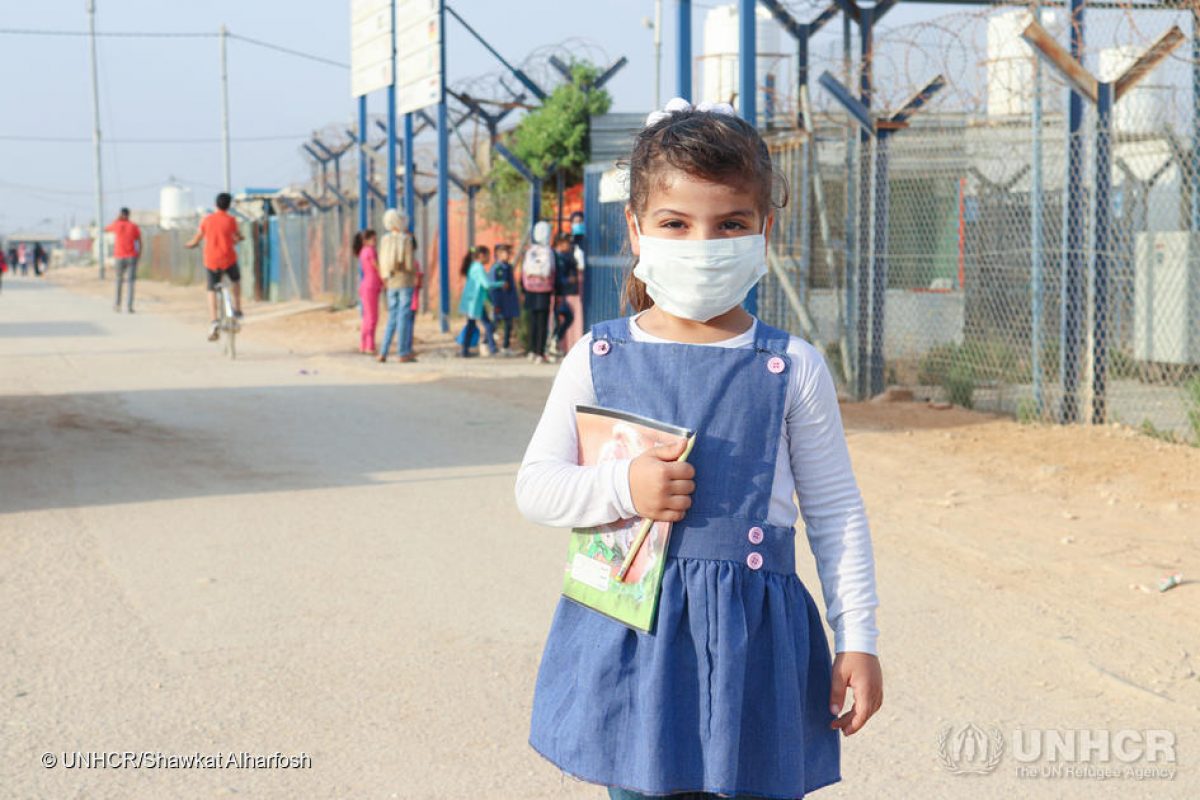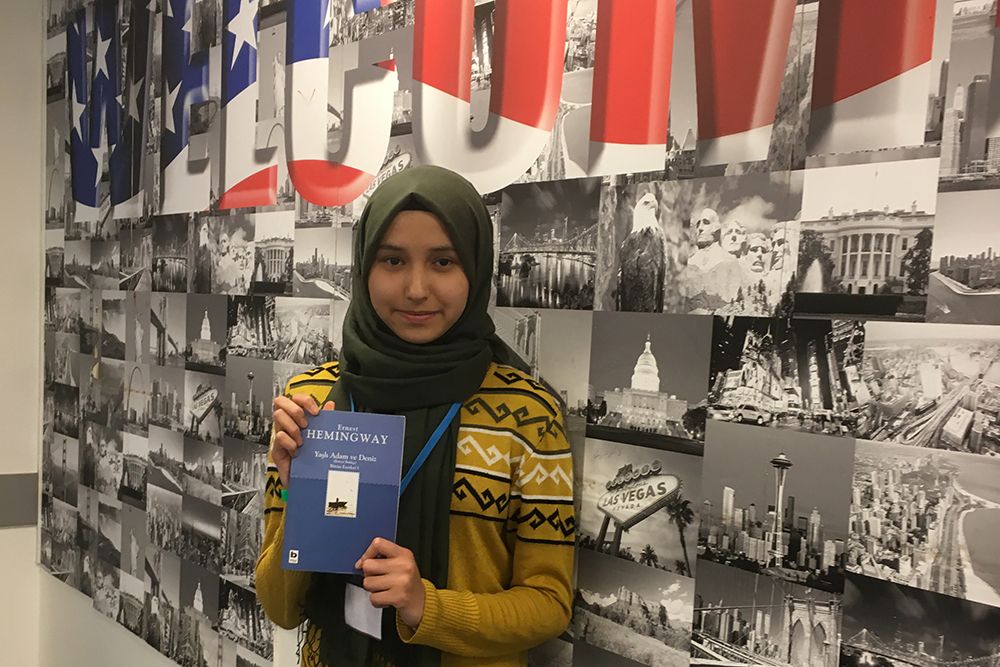Photo: A Rohingya refugee family is reunited in Indonesia. With her daughter, Jajuma fled ethnic violence in Myanmar and survived a perilous attempt to reach her husband in Malaysia. ICMC advocacy prioritizes family reunification. © Jiro Ose/UNHCR
Adapting Migration Policy to Pandemic Realities
Two years after its adoption as a groundbreaking, international framework for policy and practice, the Global Compact for Safe, Orderly, and Regular Migration (GCM) began a review process. ICMC was poised to highlight best practices and ongoing areas of concern as Regional Migration Reviews kicked off to gauge progress in implementing the GCM in the global shadow of the COVID-19 pandemic.
The first Review focused on GCM implementation in the 50-some countries of the UN Economic Commission for Europe region. Emphasizing the need to adapt implementation to pandemic realities, ICMC took part in the closing panel and proposed focusing on three actionable priorities for the coming year:
- ensuring that all migrants can access services, regardless of their status
- expanding regular pathways to migration
- enacting alternatives to detention
Protecting Those Seeking Refuge
ICMC advocated for EU Member States to adopt stronger measures in order to save lives and protect vulnerable asylum seekers along the Greek-Turkish border. A joint civil society statement delivered by ICMC at the 77th Standing Committee Meeting of the UN Refugee Agency (UNHCR) in March urged governments to respect human rights and existing laws, allow asylum seekers entry into Europe, ensure fair and efficient asylum procedures, and offer more resettlement opportunities and increased support for integration. The NGOs stressed that the criminalization of migrants and those who assist them must stop and that policies must be put into place to prevent refugees from becoming stateless.
On World Refugee Day, observed annually on 20 June, ICMC, together with other faith-based organizations, drew attention to the precarious situation of those forcibly uprooted within their own country by violence, persecution, or natural disasters. The joint statement highlighted the need, amplified by the pandemic, for greater protection for internally displaced persons (IDPs), and, in particular, for legal assistance and access to healthcare and other services.
Protecting Children on the Move
At the preparatory meeting for the regional review of GCM implementation in the UN Economic Commission for Europe (UNECE) region, ICMC delivered a strong statement urging more accessible and available child protection services, especially for unaccompanied minor migrants and refugees.
Speaking as a member organization on behalf of the Initiative for Child Rights in the Global Compacts, ICMC urged governments to use the best interests of the child as their decision-making and operational lens. The statement calls UNECE Member States to end child detention, facilitate family reunification as a regular pathway, and ensure that migrant children are not at increased risk of violence or barriers to education because of the pandemic.
As a member of the Initiative, ICMC also highlighted the opportunity posed by COVID-19 for a reset on protecting forcibly displaced children.
In a submission to the UN High Commissioner for Refugees’ Dialogue on Protection in November, the Initiative urged States to prioritize child protection. The statement underlined the need to guarantee child rights, honor resettlement commitments, and increase funding. ICMC also called for inclusive pandemic responses that give refugee and migrant children access to care and other services, with particular attention to ensuring easily accessible, non-discriminatory learning, whether in-person or digital.

The disastrous effects of the pandemic are hitting refugee children hardest, robbing them of their education, causing violence to increase. [They] will have a long road of recovery ahead unless we step up protection right now.
Mantalin Kyrou, ICMC Policy Officer, blog reflection “How Refugee Children Are Bearing the Brunt of the COVID Pandemic“
Promoting Safety, Rights, Dignity in Europe
As the coronavirus pandemic began intensifying in Europe, ICMC urged urgent action in the region to protect unaccompanied migrant children on the Greek islands.
In March, ICMC Europe joined 64 partner organizations in pressing EU governments to relocate the some 1,800 children living in Moria and other Greek island reception camps. The statement criticized the EU’s “hotspots approach,” which has fostered dangerous, inhumane conditions in the camps and ongoing human rights violations.
A month later, on the heels of the first confirmed COVID-19 cases on the Greek islands, ICMC Europe, together with some 65 NGOs, appealed again to European governments to act without delay to bring unaccompanied children to a place of safety. Their open letter on 3 April called for swift implementation of relocation commitments, with a focus on the best interests of the child and priority to family reunification.
In mid-April, ICMC Europe joined a call for EU governments to review protections for seasonal migrant workers. The joint statement pointed to the urgency of addressing unfair practices in the agri-food industry brought to light by the pandemic. The NGOs advocated for measures prioritizing safety, regular migration pathways and status, and dignified working and living conditions.
Another key focus for ICMC Europe advocacy in 2020 was the process to develop a new EU agreement on asylum and migration policy.
In February, ICMC Europe joined other civil society organizations in urging EU Member States to seize the opportunity for a strategy change regarding asylum and migration by shifting to a rights-based policy approach. The statement proposed greater focus on compliance with existing refugee law, coupled with reforms to the Dublin system regulating responsibility for processing applications among EU countries. The NGOs also highlighted the need to expand safe and regular pathways and to support integration by ensuring rights to housing, work, and social assistance.
The European Commission released policy proposals for the new EU Pact on Migration and Asylum in late September. ICMC Europe, with over 80 NGOs, expressed concern that, despite several positive aspects, the new agreement would miss the mark in improving protection for asylum seekers.
They noted that the Pact outlines expanded border screening procedures that risk undermining the right to asylum. As well, the proposed agreement resorts unnecessarily to detention. The statement highlighted the lack of support for fairer responsibility sharing among EU Member States and a focus on shifting the responsibility for asylum to non-EU third countries.
In September, ICMC Europe was one of seven major civil society organizations that called on the EU to revive refugee resettlement, put on hold due to the pandemic. The NGOs highlighted the opportunity of the proposed new EU Pact on Migration and Asylum to promote safe and regular protection solutions including resettlement, as priority actions. They appealed to Member States to honor their collective pledge at the Global Refugee Forum in 2019 to resettle 30,000 persons of concern in 2020 and to make a new, additional commitment for 2021.
Faith-based actors are inherently first responders. [They] seek to address root causes of human trafficking [and] the full restoration of survivors back into their communities.
Limnyuy Konglim, ICMC U.S. Liaison Office Head, Congressional hearing on the Trafficking Victims Protection Act
MEMBER’S STORY
Welcoming the Stranger
In 2020, ICMC national member the United States Conference of Catholic Bishops (USCCB) advocated tirelessly for U.S. migration policies in the spirit of Christ’s call to “welcome the stranger.”
USCCB welcomed a U.S. Court ruling on 17 January that stopped an earlier Presidential Executive Order giving state and local authorities the power to refuse to resettle refugees. Bishop Mario E. Dorsonville, Chair of USCCB’s Committee on Migration, said the January decision strengthened the possibility of offering a safe haven to those fleeing war, violence, or persecution.
In late February, USCCB urged the United States to resume its global leadership in protecting forcibly displaced people. During a congressional review of the 40-year-old U.S. Refugee Admissions Program, Bishop Dorsonville called for the program’s continuation as a matter of humanitarian and strategic importance. He stressed the role of faith-based organizations and the contributions resettled refugees make to the country.

ICMC national member the U.S. Conference of Catholic Bishops advocated tirelessly for migration policies that “welcome the stranger.” Photo: After being approved for resettlement, this young refugee attended cultural orientation and language classes at the ICMC-run U.S. Resettlement Support Center in Turkey. © ICMC Archive
USCCB raised its voice in response to an Executive Order on 22 April temporarily stopping all immigration, allegedly to protect the health and jobs of U.S. citizens. The bishops stressed the need to root the nation’s response to the COVID-19 pandemic in common humanity — to choose “unity and the creativity of love,” rather than “polarization and animosity.” They expressed concern that family reunification would be blocked, and named immigrants as partners in economic recovery.
In late April, USCCB spoke out for better protection of the over one million migrant farmworkers in the country, about half of whom are undocumented. The bishops highlighted the difficult living and working conditions farmworkers face and their increased vulnerability due to the pandemic. The statement recommended measures to improve migrant farmworkers’ healthcare access, housing, transportation, work safety, wages, and social benefits. “To defeat the virus, no one must be left out,” the bishops said.
In late August, USCCB joined ICMC and 178 organizations in urging the U.S. administration to return to the historic level of 95,000 refugee admissions for the 2021 fiscal year. “Resettlement is the last resort for refugees who cannot rebuild their lives where they have first fled or return safely to their home country,” the statement said. It highlighted the vital role of resettled refugees on pandemic frontlines as healthcare and food supply workers.

